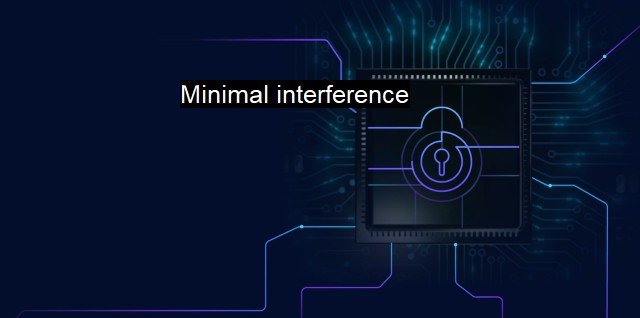What is Minimal interference?
Striking a Balance: The Importance of Minimal Interference in Cybersecurity with Antivirus Programs
Within the sphere of cybersecurity and antivirus technology, the concept of "minimal interference" refers to the harmonious balance between providing robust protection against harmful elements and not interrupting the user’s overall experience. The primary objective is to sufficiently shield devices and systems from intrusion, data theft, and other potential dangers, whilst concurrently ensuring the minimum amount of disruption to system operations as well as user activities.At the core of cybersecurity, lies the complicated task of building an impregnable digital fortress around devices and systems to prevent unauthorized access while enabling authorized users to perform their tasks with highest efficiency. An antivirus with minimal interference effectively performs this task by providing comprehensive protection without substantially affecting the system’s performance or user intervention.
The importance of minimal interference even unfolds beyond user impedance considerations; it incorporates several elements related to system administration and user experience. One of such includes resource consumption. Modern antiviruses employ several detection and prevention mechanisms that often mandate substantial processing power and memory. An antivirus portrayed as having 'minimal interference' is designed to balance its resource utilization ensuring business-wide cybersecurity whilst maintaining optimal system performance. This is essential particularly in companies where heavy applications need to run smoothly without being hampered by the antivirus.
Another critical aspect of 'minimal interference' is silent operation, which translates into the ability of an antivirus program to work in the background without being obtrusive, disabling threats without user involvement. Silent operation refrains from disrupting the user with incessant notifications, dialogs, updates, and warnings that can be inconvenient or lead to what is colloquially known as 'alert fatigue'. By optimizing the notification system, antiviruses ensure that the user receives only the ones that are crucial for them to take actions.
Automatic updates form the backbone of the minimal interference framework as well. They arming the antivirus with the most recent virus definitions and advancements in threat detection methods, without requiring the attention or action of the user. This not only protects the system from the newest threats but also reserves user intervention for only significant decision-making moments, thereby aligning itself to the 'minimal interference' philosophy.
In today’s connected world, the relevance of antivirus software having minimal interference is indeed compelling. It attempts a balancing act between contradiction objectives: optimum security levels and interference in user experience. Minimal interference ensures that security algorithms provide strong defenses against the constantly growing and evolving digital threats in a manner that isn’t only focused on the systems' safety, but the users and their experiences as well.
That said, no antivirus feature - however remarkable- can conquer the necessity of cautious and knowledgeable users. 'Minimal interference' is at its most effective when cybersecurity measures are not solely reliant on the software; savvy users form an integral part of a threat-proof system. This amalgamation forms an efficient, comprehensive circular defense model.
In summation, the principle of 'minimal interference' in antivirus and cybersecurity integrates defense and user experience into a unified whole. Antivirus that embodies minimal interference philosophy is a seamless merger of protection and performance; working quietly in the background to prevent threats ensuring its protection umbrella whilst maintaining system efficiency, and respecting the peace of users. It balances robust security and minimal disruption, acting as a true workhorse silently securing systems from the pervasive threats of the digital world.

Minimal interference FAQs
What does "minimal interference" mean in the context of cybersecurity and antivirus software?
In the context of cybersecurity and antivirus software, "minimal interference" refers to the ability of the software to protect the system without significantly impacting its performance or causing disruptions to the user's workflow.How does a cybersecurity solution achieve minimal interference?
A cybersecurity solution achieves minimal interference by using advanced technologies such as behavior-based detection and cloud-based scanning. These technologies allow the software to identify and neutralize threats in real-time without slowing down the system or interrupting the user's activities.Is minimal interference important for antivirus software?
Yes, minimal interference is essential for antivirus software as it ensures that the software does not negatively impact the user's computer performance or productivity. If an antivirus solution causes frequent disruptions, the user may be tempted to disable it, leaving their system vulnerable to cyber threats.Can an antivirus solution provide minimal interference while still providing comprehensive protection?
Yes, modern antivirus solutions are designed to provide comprehensive protection while minimizing their impact on system performance. With advanced technologies such as machine learning and artificial intelligence, antivirus software can detect and neutralize threats in real-time, without causing significant interference to the system or user's workflow.| | A | | | B | | | C | | | D | | | E | | | F | | | G | | | H | | | I | | | J | | | K | | | L | | | M | |
| | N | | | O | | | P | | | Q | | | R | | | S | | | T | | | U | | | V | | | W | | | X | | | Y | | | Z | |
| | 1 | | | 2 | | | 3 | | | 4 | | | 7 | | | 8 | | |||||||